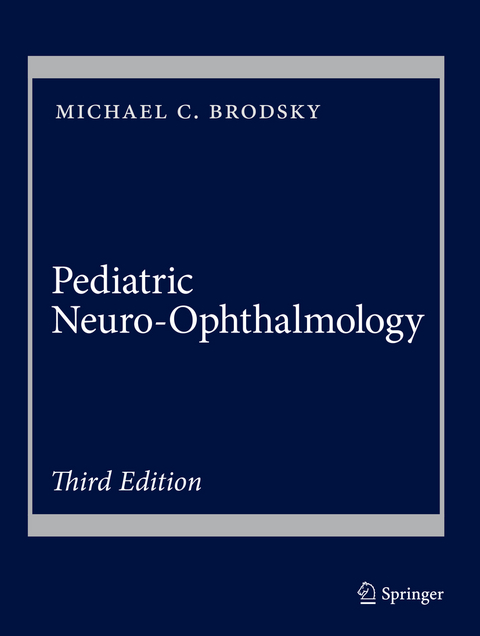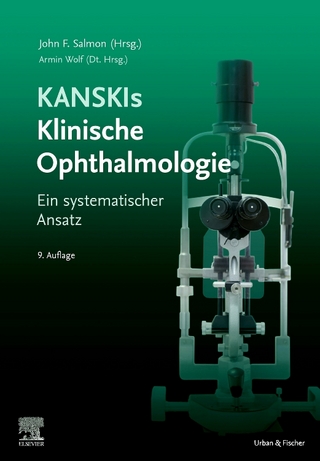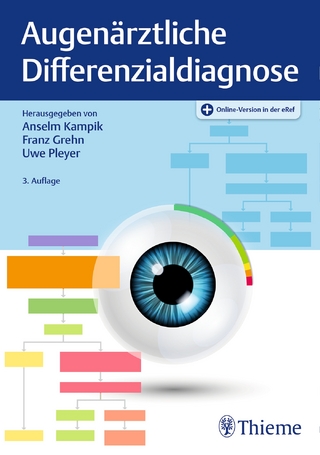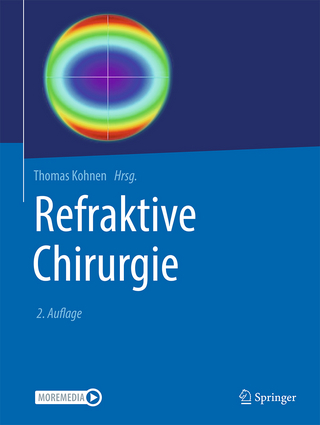
Pediatric Neuro-Ophthalmology
Springer-Verlag New York Inc.
978-1-4939-3382-2 (ISBN)
Michael C. Brodsky, MDProfessor of Ophthalmology and NeurologyKnights Templar Professor of Ophthalmology ResearchMayo Clinic College of MedicineRochester, MN USA
1. The Apparently Blind Infant.- Introduction.- Hereditary Retinal Disorders.- Leber Congenital Amaurosis.- Joubert Syndrome.- Congenital Stationary Night Blindness.- Achromatopsia.- Congenital Optic Nerve Disorders.- Cortical Visual Insufficiency.- Causes of Cortical Visual Loss.- Neurologic and Systemic Disorders.- Characteristics of Visual Function.- Neuro-Ophthalmologic Findings.- Diagnostic and Prognostic Considerations.- Role of Visual Attention.- Subcortical Visual Loss (or Periventricular Leukomalacia).- Neuroimaging Abnormalities and their Implications.- Neuro-Ophthalmologic Findings.- Perceptual Difficulties.- Dorsal and Ventral Stream Dysfunction.- Pathophysiology.- Intraventricular Hemorrhage.- Periventricular and Intraventricular Hemorrhage.- Hemianopic Visual Field Defects in Children.- Delayed Visual Maturation.- Blindsight.- The Effect of Total Blindness on Circadian Regulation.- Horizons.- 2. Congenital Optic Disc Anomalies.- Introduction.- Optic Nerve Hypoplasia.- Excavated Optic Disc Anomalies.- Morning Glory Disc Anomaly.- Optic Disc Coloboma.- Peripapillary Staphyloma.- Megalopapilla.- Optic Pit.- Papillorenal Syndrome (The Vacant Optic Disc).- Congenital Tilted Disc Syndrome.- Optic Disc Dysplasia.- Congenital Optic Disc Pigmentation.- Aicardi Syndrome.- Doubling of the Optic Disc.- Optic Nerve Aplasia.- Myelinated (Medullated) Nerve Fibers.- The Albinotic Optic Disc.- 3. The Swollen Optic Disc.- Papilledema.- Idiopathic Intracranial Hypertension (IIH) in Children.- Optic Disc Swelling Secondary to Neurological Disease.- Optic Disc Swelling Secondary to Systemic Disease.- Uveitis.- Posttraumatic Optic Disc Swelling.- Intrinsic Optic Disc Tumors.- Optic Disc Hemangioma.- Tuberous Sclerosis.- Optic Disc Glioma.- Combined Hamartoma of the Retina and RPE.- Retrobulbar Tumors.- Optic Neuritis in Children.- History and Physical Examination.- Postinfectious Optic Neuritis.- Disseminated Encephalomyelitis.- MS and Pediatric Optic Neuritis.- Devic Disease (Neuromyelitis Optica).- Prognosis and Treatment.- Course of Visual Loss and Visual Recovery.- Systemic Prognosis.- Systemic Evaluation of Pediatric Optic Neuritis.- Treatment.- Leber Idiopathic Stellate Neuroretinitis.- Ischemic Optic Neuropathy.- Autoimmune Optic Neuropathy.- Pseudopapilledema.- Optic Disc Drusen.- Ocular Disorders Associated with Pseudopapilledema.- Systemic Disorders Associated with Pseudopapilledema.- 4. Optic Atrophy.- Introduction.- Optic Atrophy Associated with Retinal Disease.- Optic Atrophy Vs. Hypoplasia.- Causes of Optic Atrophy in Children.- Compressive/Infiltrative Intracranial Lesions.- Noncompressive Causes of Optic Atrophy in Children with Brain Tumors.- Hereditary Optic Atrophy.- Dominant Optic Atrophy (Kjer Type).- Leber Hereditary Optic Neuropathy.- Recessive Optic Atrophhy.- Behr Syndrome.- Wolfram Syndrome (DIDMOAD).- Toxic/Nutritional Optic Neuropathy.- Neurodegenerative Disorders with Optic Atrophy.- Organic Acidurias.- Optic Atrophy due to Hypoxia-Ischemia.- Traumatic Optic Atrophy.- Miscellaneous Causes.- Summary of the General Approach to the Child with Optic Atrophy.- 5. Transient, Unexplained, and Psychogenic Visual Loss .- Introduction.- Transient Visual Loss.- Migraine.- Epilepsy.- Posttraumatic Transient Cerebral Blindness.- Cardiogenic Embolism.- Nonmigrainous Cerebrovascular Disease.- Miscellaneous Transient Visual Disturbances in Children.- Toxic and Nontoxic Drug Effects.- Summary of Clinical Approach to the Child with Transient Visual Disturbances.- Laboratory Evaluation of Transient Visual Disturbances in Children.- Unexplained Visual Loss in Children.- Causes of Unexplained Visual Loss in Childhood.- Psychogenic Visual Loss in Children.- Clinical Profile.- Neuro-Ophthalmologic Findings.- Categories of Psychogenic Visual Loss in Children.- Management of Psychogenic Visual Loss in Children .- Horizons.- 6. Ocular Motor Nerve Palsies.- Introduction.- Oculomotor Nerve Palsy.- Clinical Anatomy.- Clinical Features.- Partial Forms of Oculomotor Palsy.- Oculomotor Synkinesis.- Etiology.- Vascular Third Nerve Palsy in Children.- Differential Diagnosis.- Management.- Trochlear Nerve Palsy.- Clinical Anatomy.- Clinical Features.- Bilateral Trochlear Nerve Palsy.- Etiology.- Differential Diagnosis.- Treatment.- Abducens Nerve Palsy.- Anatomy.- Clinical Features.- Causes of Sixth Nerve Palsy.- Differential Diagnosis.- Duane Retraction Syndrome.- Management of Sixth Nerve Pals.- Multiple Cranial Nerve Palsies in Children.- Horizons.- 7. Complex Ocular Motor Disorders.- Introduction.- Strabismus in Children with Neurological Dysfunction.- Visuovestibular Disorders.- Neurologic Esotropia.- Neurologic Exotropia.- Skew Deviation.- Gaze Palsies, Gaze Deviations, and Ophthalmoplegia.- Horizontal Gaze Palsy in Children.- Congenital Ocular Motor Apraxia.- Vertical Gaze Palsies in Children.- Diffuse Ophthalmoplegia in Children.- Chronic Progressive External Ophthalmoplegia.- Myasthenia Gravis.- Olivopontocerebellar Atrophy.- Botulism.- Fisher Syndrome: A Variant of Guillain–Barré Syndrome.- Bickerstaff Brainstem Encephalitis.- Tick Paralysis.- Wernicke Encephalopathy.- Miscellaneous Causes of Ophthalmoplegia.- Transient Ocular Motor Disturbances of Infancy.- Transient Neonatal Strabismus.- Transient Idiopathic Nystagmus.- Tonic Downgaze.- Tonic Upgaze .- Neonatal Opsoclonus .- Transient Vertical Strabismus in Infancy.- Congenital Cranial Dysinnervation Syndromes.- Congenital Ptosis.- Marcus Gunn Jaw Winking (Trigemino-Oculomotor Synkinesis).- Congenital Fibrosis Syndrome.- Congenital Horizontal Gaze Palsy with Scoliosis.- Möbius Sequence.- Monocular Elevation Deficiency, or “Double Elevator Palsy”.- Brown Syndrome.- Other Pathologic Synkineses.- Internuclear Ophthalmoplegia.- Cyclic, Periodic, or Aperiodic Disorders Affecting Ocular Structures.- Ocular Neuromyotonia.- Ocular Motor Adaptations and Disorders in Patients with Hemispheric Abnormalities.- Movement Tics.- Eyelid Abnormalities in Children.- Congenital Ptosis.- Excessive Blinking in Children.- Hemifacial Spasm.- Eyelid Retraction.- Apraxia of Eyelid Opening.- Pupillary Abnormalities.- Congenital Bilateral Mydriasis.- Accommodative Paresis.- Adie Syndrome.- Horner Syndrome.- 8. Nystagmus.- Introduction.- Infantile Nystagmus.- Clinical Features.- Onset of Infantile Nystagmus.- Terminology.- History and Physical Examination.- ERG.- Hemispheric Visual Evoked Potentials.- Overlap of Infantile Nystagmus and Strabismus.- Eye Movement Recordings in Infantile Nystagmus.- Contrast Sensitivity and Pattern Detection Thresholds in Infantile Nystagmus.- Theories of Causation.- Visual Disorders Precipitating Infantile Nystagmus.- When to Obtain Neuroimaging Studies in Children with Nystagmus.- Treatment.- Spasmus Nutans.- Russell Diencephalic Syndrome of Infancy.- Monocular Nystagmus.- Nystagmus Associated with Infantile Esotropia.- Torsional Nystagmus.- Horizontal Nystagmus.- Nystagmus.- Nystagmus Blockage Syndrome.- Treatmentof Nystagmus Blockage Syndrome.- Vertical Nystagmus.- Upbeating Nystagmus in Infancy.- Congenital Downbeat Nystagmus.- Hereditary Vertical Nystagmus.- Periodic Alternating Nystagmus.- Seesaw Nystagmus.- Congenital versus Acquired Seesaw Nystagmus.- Saccadic Oscillations that Simulate Nystagmus.- Retraction Nystagmus.- Opsoclonus and Ocular Flutter.- Voluntary Nystagmus.- Ocular Bobbing.- Neurological Nystagmus.- Leigh Subacute Necrotizing Encephalomyelopathy.- Pelizaeus-Merzbacher Disease.- Joubert Syndrome.- Santavuori-Haltia Disease.- Infantile Neuroaxonal Dystrophy.- Deficient Glycoprotein Syndromes.- Down Syndrome.- Hypothyroidism.- Maple Syrup Urine Disease.- Nutritional Nystagmus.- Epileptic Nystagmus.- Cobalamin C Methylmalonic Aciduria and Homocystinuria.- Familial Vestibulocerebellar Disorder.- Summary.- 9. Torticollis and Head Oscillations.- Introduction.- Torticollis.- Ocular Torticollis.- Head Tilts.- Head Turns.- Vertical Head Positions.- Refractive Causes of Torticollis.- Neuromuscular Causes of Torticollis.- Systemic Causes of Torticollis.- Head Oscillations.- Head Nodding with Nystagmus.- Head Nodding without Nystagmus.- Visual Disorders.- Otological Abnormalities.- Systemic Disorders.- 10. Neuro-Ophthalmologic Manifestations of Neurodegenerative Disorders.- Introduction.- Neuronal Disease.- Neuronal Ceroid Lipofuscinosis.- Lysosomal Diseases.- Gangliosidoses.- Mucopolysaccharidoses.- Subacute Sclerosing Panencephalitis.- White Matter Disorders.- Metachromatic Leukodystrophy.- Canavan Disease (Spongy Degeneration of Cerebral White Matter).- Krabbe Disease.- Pelizaeus–Merzbacher Disease.- Cockayne Syndrome.- Alexander Disease.- Sjögren–Larsson Syndrome.- Cerebrotendinous Xanthomatosis.- Peroxisomal Disorders.- Zellweger Syndrome.- Adrenoleukodystrophy.- Basal Ganglia Disease.- Pantothenate Kinase-Associated Neurodegeneration.- Wilson Disease.- Aminoacidopathies and Other Biochemical Defectsl.- Maple Syrup Urine Disease.- Homocystinuria.- Abetalipoproteinemia.- Mitochondrial Encephalomyelopathies.- Chronic Progressive External Ophthalmoplegia (CPEO).- Leigh Subacute Necrotizing Encephalomyelopathy.- Mitochondrial Encephalomyelopathy and Stroke-Like Episodes (MELAS).- Myoclonic Epilepsy and Ragged Red Fibers (MERRF).- Mitochondrial Depletion Syndrome.- Congenital Disorders of Glycosylation.- Horizons.- 11. Neuro-Ophthalmologic Manifestations of Systemic and Intracranial Disease.- Introduction.- The Phakomatoses.- Neurofibromatosis (NF1).- Neurofibromatosis 2 (NF2).- Tuberous Sclerosis.- Sturge–Weber Syndrome.- von Hippel–Lindau Disease.- Ataxia Telangiectasia.- Linear Nevus Sebaceous Syndrome.- Klippel–Trenauney–Weber Syndrome.- Brain Tumors.- Suprasellar Tumors.- Arachnoid Cysts.- Cavernous Sinus Lesions.- Hemispheric Tumors.- Posterior Fossa Tumors.- Brainstem Tumors.- Tumors of the Pineal Region.- Meningiomas.- Epidermoids and Dermoids.- Gliomatosis Cerebri.- Metastasis.- Complications of Treatment of Intracranial Tumors inChildren.- Hydrocephalus.- Hydrocephalus due to CSF Overproduction.- Noncommunicating Hydrocephalus.- Communicating Hydrocephalus.- Common Causes of Hydrocephalus in Children.- Clinical Features of Hydrocephalus.- Effects and Complications of Treatment.- Vascular Lesions.- AVMs.- Cavernous Angiomas.- Intracranial Aneurysms.-Isolated Venous Ectasia.- Craniocervical Arterial Dissection.- Strokes in Children.- Cerebral Venous Thrombosis.- Cerebral Dysgenesis and Intracranial Malformations.- Destructive Brain Lesions.- Malformations Due to Abnormal Stem Cell Proliferation or Apoptosis.- Malformations Due to Abnormal Neuronal Migration.- Malformations Secondary to Abnormal Cortical Organization and Late Migration.- Anomalies of the Hypothalamic–Pituitary Axis.- Encephaloceles.- Cerebellar Malformations.- Miscellaneous.- Congenital Corneal Anesthesia.- Reversible Posterior.- Leukoencephalopathy.- Cerebroretinal Vasculopathies.- Syndromes with Neuro-Ophthalmologic Overlap.- Proteus Syndrome.-PHACE Syndrome.- Goldenhar Syndrome.- Oculoauriculovertebral Dysplasia).- Delleman (Oculocerebrocutaneous) Syndrome.- Encephalocraniocutaneous Lipomatosis.- Incontinentia Pigmenti (Bloch–Sulzberger Syndrome).
| Erscheinungsdatum | 08.01.2016 |
|---|---|
| Zusatzinfo | 146 Illustrations, color; 148 Illustrations, black and white; XXI, 823 p. 294 illus., 146 illus. in color. |
| Verlagsort | New York |
| Sprache | englisch |
| Maße | 210 x 279 mm |
| Themenwelt | Medizin / Pharmazie ► Medizinische Fachgebiete ► Augenheilkunde |
| Medizin / Pharmazie ► Medizinische Fachgebiete ► Neurologie | |
| Medizin / Pharmazie ► Studium | |
| Schlagworte | Blind • Neurology • Ophthalmology • optic atrophy • optic disk • Pediatrics • Visual loss |
| ISBN-10 | 1-4939-3382-5 / 1493933825 |
| ISBN-13 | 978-1-4939-3382-2 / 9781493933822 |
| Zustand | Neuware |
| Haben Sie eine Frage zum Produkt? |
aus dem Bereich


